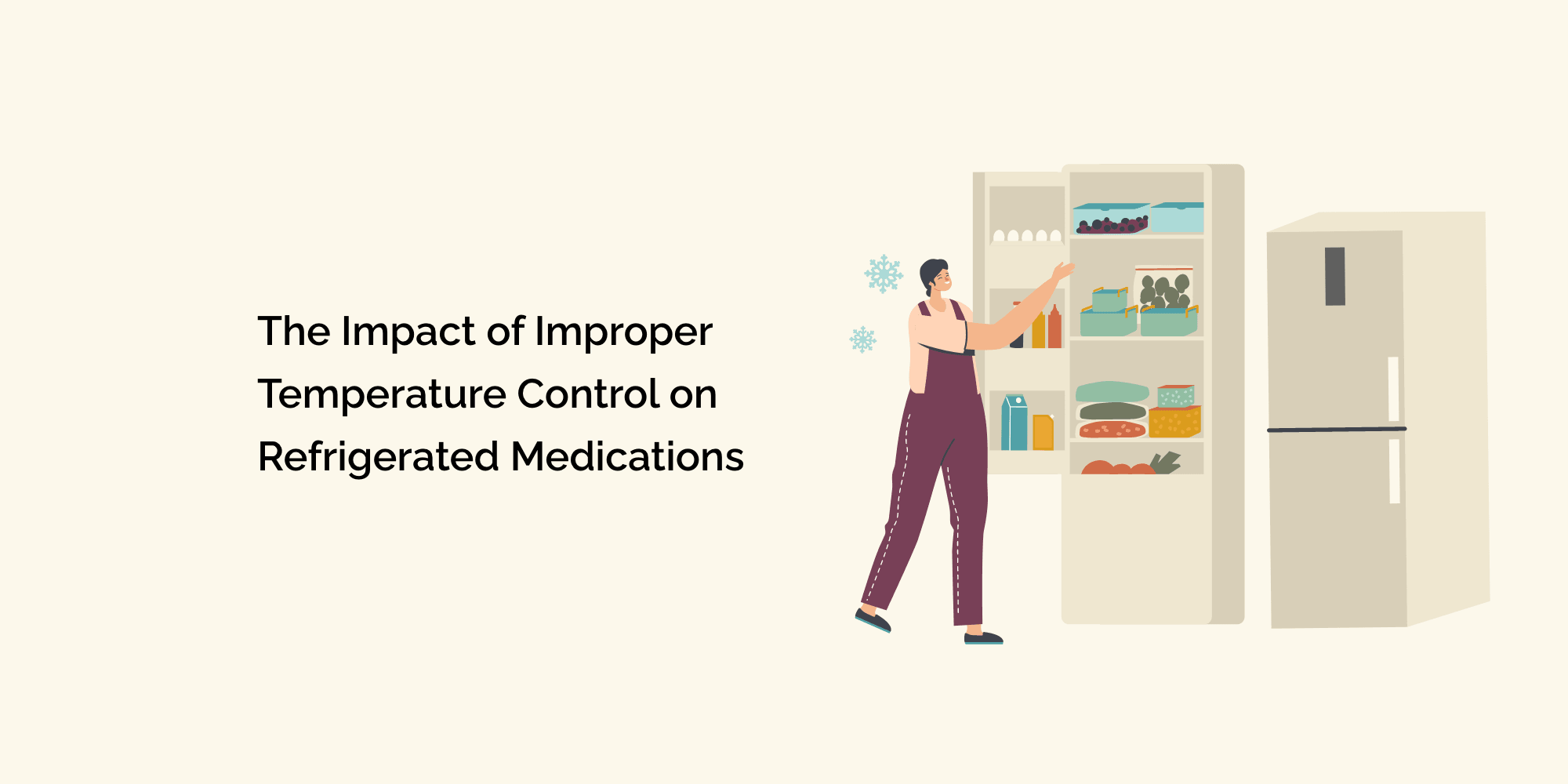Temperature control is a critical aspect of medication storage, especially for refrigerated medications. Many medications, particularly biologics and certain vaccines, require specific temperature ranges to maintain their stability and effectiveness. However, improper temperature control can have a significant impact on the quality and safety of refrigerated medications.
In this blog, we will explore the consequences of inadequate temperature control, the risks associated with temperature deviations, and the measures that can be taken to ensure the integrity of refrigerated medications. By understanding the impact of improper temperature control, healthcare providers and individuals can take proactive steps to maintain the efficacy and safety of refrigerated medications.
The Importance of Temperature Control for Refrigerated Medications:
Refrigerated medications, such as insulin, certain vaccines, and biologics, contain sensitive compounds that can degrade when exposed to inappropriate temperatures. Maintaining the recommended storage temperature range, typically between 2°C and 8°C (36°F and 46°F), is crucial to ensure the stability and effectiveness of these medications. Deviations from this range can have various consequences:
-
Loss of Medication Potency: Exposure to temperatures outside the recommended range can lead to the degradation of active ingredients in medications. This can result in a loss of potency, rendering the medication less effective or completely ineffective.
-
Reduced Therapeutic Efficacy: Medications that have been exposed to improper temperatures may not provide the intended therapeutic effect when administered. This can lead to inadequate treatment outcomes and potential health risks for patients.
-
Increased Risk of Adverse Effects: Temperature deviations can compromise the stability and safety of medications, potentially leading to adverse effects. Patients may experience unexpected side effects or allergic reactions due to the degradation of the medication's active ingredients.
-
Wasted Medication Supply: When refrigerated medications are exposed to inappropriate temperatures, they may become unsuitable for use and need to be discarded. This results in significant financial losses and contributes to medication shortages.
-
Potential Health Risks: Inadequate temperature control can increase the risk of medication errors, as healthcare providers may unknowingly administer compromised medications. This can compromise patient safety and potentially worsen medical conditions.
Risks and Consequences of Temperature Deviations:
Temperature deviations in refrigerated medications can have severe consequences for patient health and well-being:
-
Loss of Medication Effectiveness: Temperature excursions, whether due to power outages, equipment malfunctions, or improper storage practices, can result in a loss of medication effectiveness. Patients may experience inadequate symptom relief or delayed recovery.
-
Reduced Patient Compliance: Medications that have been compromised by improper temperature control may lose their desired effect. Patients who do not experience the expected therapeutic benefits may become disillusioned with their treatment and may be less likely to adhere to their prescribed medication regimen.
-
Increased Healthcare Costs: Inefficient temperature control practices can lead to the wastage of refrigerated medications. Healthcare facilities incur additional costs in replacing discarded medications, contributing to financial burdens and impacting the overall healthcare budget.
-
Legal and Regulatory Implications: Improper temperature control for medications can lead to legal and regulatory consequences. Healthcare providers are responsible for ensuring appropriate storage conditions and complying with regulations to maintain the safety and efficacy of refrigerated medications.
-
Compromised Patient Trust and Satisfaction: Inadequate temperature control resulting in the compromised effectiveness of refrigerated medications can erode patient trust and satisfaction. Patients rely on healthcare providers to provide them with safe and effective medications. Failure to meet these expectations can lead to dissatisfaction and loss of confidence in the healthcare system.
Ensuring Proper Temperature Control for Refrigerated Medications:
To mitigate the risks associated with improper temperature control and protect the integrity of refrigerated medications, several measures can be taken:
-
Proper Storage and Handling: Follow medication-specific guidelines and manufacturer instructions for storage and handling. Store refrigerated medications at the recommended temperature range and avoid exposure to extreme temperatures, direct sunlight, or other sources of heat.
-
Temperature Monitoring and Logging: Implement continuous temperature monitoring systems in refrigeration units storing medications. These systems can provide real-time temperature data, send alerts for temperature deviations, and log temperature records for auditing and analysis.
-
Backup Power Systems: Install backup power systems, such as uninterruptible power supply (UPS) units or generators, to ensure continued temperature control during power outages or equipment failures.
-
Staff Education and Training: Educate healthcare providers and staff members on the importance of temperature control for refrigerated medications. Train them on proper storage practices, temperature monitoring, and response protocols for temperature deviations.
-
Regular Maintenance and Calibration: Conduct routine maintenance checks on refrigeration units to ensure they are functioning properly. Calibrate temperature monitoring equipment regularly to maintain accurate readings.
-
Quality Assurance and Auditing: Implement quality assurance programs that include regular audits and inspections of medication storage areas. Verify compliance with temperature control requirements, storage practices, and documentation of temperature records.
Conclusion:
Proper temperature control is crucial for maintaining the efficacy, safety, and integrity of refrigerated medications. Inadequate temperature control can lead to the loss of medication potency, reduced therapeutic efficacy, wasted medication supply, increased healthcare costs, and potential health risks for patients. To mitigate these risks, healthcare providers and individuals must prioritize appropriate storage practices, continuous temperature monitoring, staff education, and regular maintenance of refrigeration units.
By ensuring proper temperature control for refrigerated medications, healthcare providers can safeguard patient health, improve treatment outcomes, and maintain trust in the healthcare system. Let us recognize the significance of temperature control in medication storage and take proactive measures to ensure the quality and safety of refrigerated medications.








